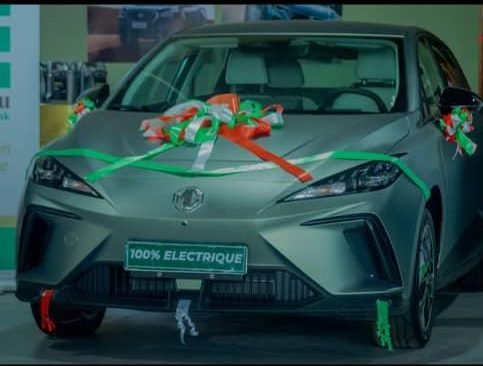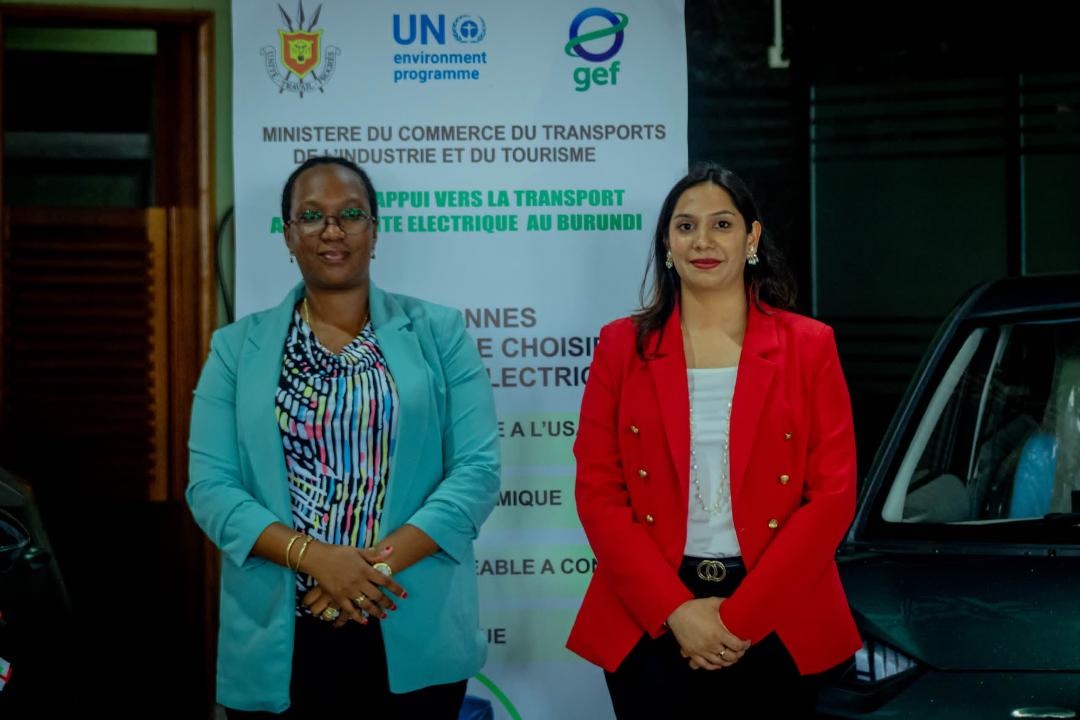BUJUMBURA, March 20th (ABP) – The Minister of Trade, Transport, Industry and Tourism, Marie Chantal Nijimbere, opened the day dedicated to the promotion of electric mobility in Burundi on Tuesday, March 18, 2024. The day was organized by the said ministry in partnership with Skylne S.P.R.L., and was themed, “Accelerating the transmission towards electric mobility in Burundi,” for all stakeholders directly or indirectly involved in the electrification of road transport, in order to achieve zero-emission mobility in the country.
On that occasion, Minister Nijimbere indicated that the road transport sector contributes significantly to climate change because vehicles emit greenhouse gases (GHG) responsible for global warming and which have major impacts on human health and the economy of States. Indeed, these emissions are responsible for several respiratory, cardiovascular, and infectious diseases, as well as climate disruptions that cause floods that destroy transportation, energy, and communications infrastructure.
To tackle the problem of climate change, she argued, there must be change in transportation policies and habits globally, opting for electric mobility, which is currently being touted as a lever for transforming the road transport sector.
Furthermore, to achieve the goals of the Paris Climate Agreement and reduce growing air pollution, with its harmful consequences for humanity, it is essential that low- and middle-income countries, including Burundi, join the global movement toward electric mobility. It is within this framework that the African Union has identified the development of renewable energy sources, a low-carbon economy, reducing emissions in the transport sector, access to less polluting electric vehicles, and reliable energy for road transport as fundamental objectives towards achieving zero greenhouse gas emissions in Africa.
Minister Nijimbere also noted that one of the main obstacles to achieving the national vision in the road transport sector is the country’s excessive dependence on imported fossil fuels. In this regard, she said, regular fuel supply difficulties disrupt economic activities by increasing the cost of goods and services and hinder the mobility of goods and people. These constraints constitute obstacles to the country’s economic and social development.
Thus, the transition to electric mobility represents one of the strategic and sustainable solutions to reduce the dependence. By massively adopting electric vehicles, Burundi will not only be able to mitigate the effects of the oil crisis, but also contribute to reducing greenhouse gas emissions and achieving the Sustainable Development Goals (SDGs).
With technical support from the United Nations Environment Program (UNEP), the Ministry of Transport, through the Electric Mobility Transition Support Project, will spare no effort to accelerate the transition to electric mobility, she said.
She also indicated that consulting firms are being recruited, one to draw up a national policy and strategy on electric mobility in Burundi and for implementation tools, while another firm of consultants specializing in electric vehicle technologies and electric vehicle charging infrastructure is underway.
The said ministry, through the project to support the transition to electric mobility, will conduct awareness campaigns during the second half of the year, for stakeholders in particular and the population in general on the advantages of electric mobility across the 5 new provinces of the country.
According to her, opting for an electric vehicle means choosing an environmentally friendly and less polluting car, improving human health and it’s also an important economic choice.

For her part, Mrs. Radhika B., Skyline’s sales director, noted that electric mobility is already being adopted in all countries around the world, the reason why Burundi has also adopted it. According to her, electric mobility doesn’t only apply to electric vehicles, but also to motorcycles, buses, and bicycles. To charge them, she explained that they will install electric stations in various locations across the country to facilitate those who need to charge their batteries. The charging time for these vehicles’ batteries is one and a half hours at the stations and 24 hours at home.
Currently, she said, this company only makes electric vehicles available to the public, noting that 25 are on the market. The advantages of this electric mobility include its economic use, its pleasant driving characteristics, and its civic-mindedness.
It is worth noting that the price of these vehicles, depending on the category, ranges from 10,000 to 50,000 US dollars.

